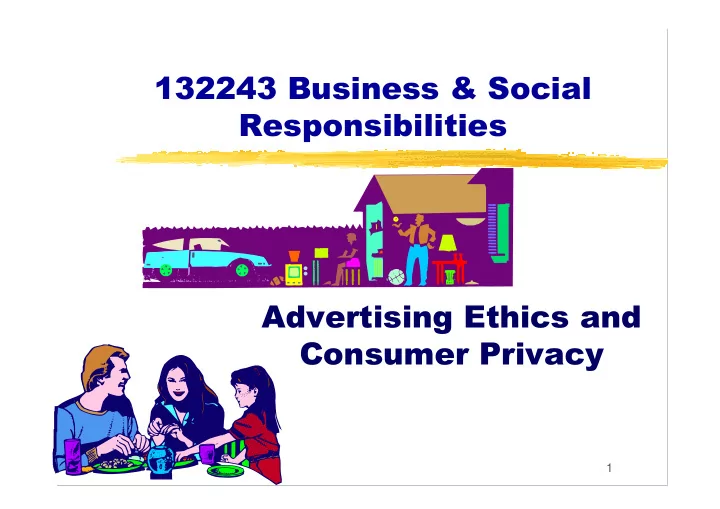

132243 Business & Social Responsibilities Advertising Ethics and Consumer Privacy 1
Commercial Advertising Definition: communication between a seller and potential buyers that is publicly addressed to a mass audience and is intended to induce members of this audience to buy the seller’s products. Characteristics: Public communication aimed at a mass audience Intended to induce members of its audience to buy the seller’s products Succeeds by creating a desire for the seller’s product or a belief that a product will satisfy a preexisting desire 2
Social Effects of Advertising Psychological Effects: Advertisements are boring, insipid, and insult the intelligence of viewers. Advertisements develop nonmaterialistic attitude. Advertising and Waste: The costs of resources consumed by advertising are (wasted) selling costs. Advertising does nothing more than shift demand from one firm to another. Increasing consumption are a cause of pollution and resource depletion problems. 3
Social Effects of Advertising (cont.) Advertising and Market Power: Adverting reduces competition and raises barriers to entry into markets. 4
Social Effects of Advertising (cont.) Advertising Lovers: Difficult to change people’s beliefs and attitudes Advertising produces and transmits information Advertising produces a beneficial rise in demand for all products No statistical connection between advertising intensity and market concentration 5
Advertising and the Creation of Consumer Desires 2 desires: (Finite) Physical desires: food and shelters (Infinite) Psychological desires: goods that give a person psychological rewards John K. Galbraith Advertising create new demands by manipulating the psychic desires. Production is not modeled to serve human desires, rather, human desires are modeled to serve the needs of production. Advertising violates right to choose: it manipulates the consumers. 6
Advertising and the Creation of Consumer Desires (cont.) Some advertisements intend to manipulate, especially ones that aim at children. Advertising Lovers: New wants are created by the invention of novel and attractive products 7
Advertising and Consumer Beliefs Deceptive advertising can take several forms: deceptive mock-ups Untrue paid testimonials Inserting the word guarantee where nothing is guaranteed No defects disclosed Misleadingly disparaging a competitor’s goods Stimulating well-known brand names 8
Advertising and Consumer Beliefs (cont.) Deceptive advertising violates consumers’ rights to choose for themselves (Kantian argument) and generates a public distrust of advertising that diminishes the utility of this form and even other forms of communication (the utilitarian argument). 9
Advertising and Consumer Beliefs (cont.) Deceptive Advertising Is a Function of The author’s intent to make the audience believe what is known to be false The media’s communication of the false message The audience’s vulnerability to deception 10
Consumer Privacy Advances in computer processing power, database software, and communication technology reduce consumer privacy (e.g. medical history, credit information, personal information, etc.). 2 types of privacy Psychological privacy is privacy with respect to a person’s inner life. Physical privacy is privacy with respect to a person’s physical activities. 11
Consumer Privacy (cont.) Right to privacy; the right of persons to determine what, to whom, and how much information about themselves will be disclosed to other parties. Importance of privacy: Protects individuals from shame, interference, hurting loved ones, self- incrimination Enables the development of personal relationships, professional relationships, distinct social roles, and self-determination 12
Consumer Privacy (cont.) Several keys to balance consumers’ rights and legitimate needs of businesses: Relevance Informing Consent Accuracy Purpose Recipients and security 13
Recommend
More recommend